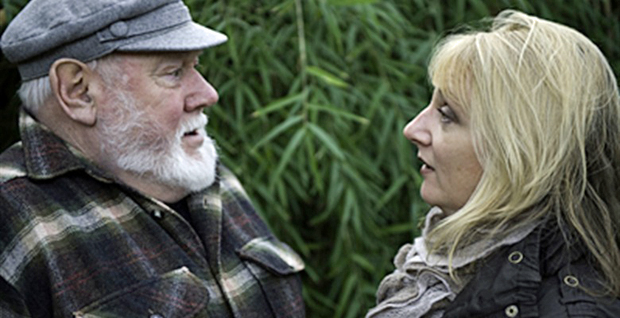KIN is Showing @ Traverse Theatre, Edinburgh, Thu 10 – Sat 12 Nov – see below for full listing.
The indescribable relationship shift which takes place between middle-aged children and their elderly parents is the subject of Donna Rutherford’s new semi-community project KIN – originating from interviews and discussions to a final production now touring around Scotland and other parts of the UK and Ireland. As the roles within families change as ageing children have more of a supporting role in their parents’ lives, as well as firming up their political or moral opinions on certain issues, the shift which can take place in expectation and perception can be a frightening and intensely uncertain one.
Mixed between audio, visual and live performance, Rutherford creates a theatrical piece in which she tracks the progression from youth to old age by making morning coffee, afternoon tea and evening coco – a symbol for the progression and almost ritualistic nature of our everyday lives. Rutherford explains how the piece is “very much about the unavoidable in that we’re quite good at avoiding change because it is difficult. It talks a lot about the fixed roles that siblings have due to birth order or personality and how once you’re pulled back into the family situation to give more support it’s difficult for the parents and siblings to acknowledge that you’ve changed and learnt how to deal with things better”.
it’s about looking at the dysfunction within the functionality
Recorded interviews are used in the performance to compliment the live action, as a series of talking heads probe the nature of the family. Rutherford explains that “the talking to camera is done in documentary style and I go from a mixture of my own live presentation bits, from being very direct with the audience, to using quite poetic language – so it crosses quite a few formats which seem to work”. It gives the performance a subtly retrospective analysis of the bond between parent and child, mingling it with the artistic sensibilities which dramatise a difficult experience.
So the piece seems as much as anything to be about reflection, to approach the idea of family from different viewpoints and experiences which can either help or conflict with opinions between siblings and kinfolk. Rutherford however has managed to keep the piece focussed as it tussles against a certain ambiguity and mysteriousness. She explains how “it’s about relatively functional families. I didn’t expect people coming forward to tell a story if they had very difficult relationships with their parents. So it’s about looking at the dysfunction within the functionality.” And this focus prevents it from lecturing on the nature of loss, as Rutherford explains that she hasn’t experienced the death of a parent: “it’s a piece about being on the cusp of something, something inevitable, something unavoidable, something unspoken. No-one has died, no-one is in need of 24/7 care but they’re thinking about it a lot.”
it’s about the subtle shifts and how the child and parent negotiate those changes
Her role then becomes that of a documentary filmmaker almost, offering the chance for people to interact on the issues of family struggle without becoming too involved in the subject. Rutherford explains that “I don’t do drama therapy. So it’s not about that, but an offshoot from that is giving a platform to these difficult conversations”. Essentially, this platform is trying to make sense of an emotion which is confusing and tentative – either as the child begins to assume the role of the elderly parent, longs for the relationship experienced earlier in life or becomes more equipped to support difficulties the parent may be having.
This transferability of the piece’s investigation seems quite extensive. Students who have moved away from home to study and young kids who go straight into full-time work will have experienced the change in relationship with their parents as they enter the adult world, while young professionals will appreciate the nature of home owning and financial responsibility, arguably making the link with their parents more accessible. The beauty of this project lies in its humbleness, and Rutherford sums this up when saying “it’s about the subtle shifts and how the child and parent negotiate those changes”.
A series of audio interviews/performance can be heard in the Traverse Bar Cafe as part of Listening Posts.
You can also find audio and video extracts from KIN here.
SHOW RUN:
Cumbernauld Theatre Cumbernauld Theatre, Kildrum, Cumbernauld, G67 2BN
Friday 4th November 7.45pm
Tickets:£8/ £6 concession Under 18’s
Box Office: 01236 732887
Traverse Theatre 10 Cambridge Street, Edinburgh EH1 2ED
Thursday 10 – Saturday 12 November 8pm
Tickets: Thursday 10th – £15 (£11 concession / £6 unemployed); Friday 11th & Saturday 12th – £17 (£13 concession)
Box Office: 0131 228 1404
Eden Court One Touch Theatre, Bishop’s Road, Inverness IV3 5SA
Tuesday 15th November 8pm
Tickets: £10/ £8 concession
Box Office: 01463 234234
Byre Theatre 27th January 2012
Eastgate Arts, Peebles 2nd February
An Lanntair, Stornoway 9th February
Lemon Tree, Aberdeen 16th February
Colchester Arts Centre 23rd February
Prema Arts Centre, Uley, Glos. 25th February
The Lowry,Salford 2nd March
